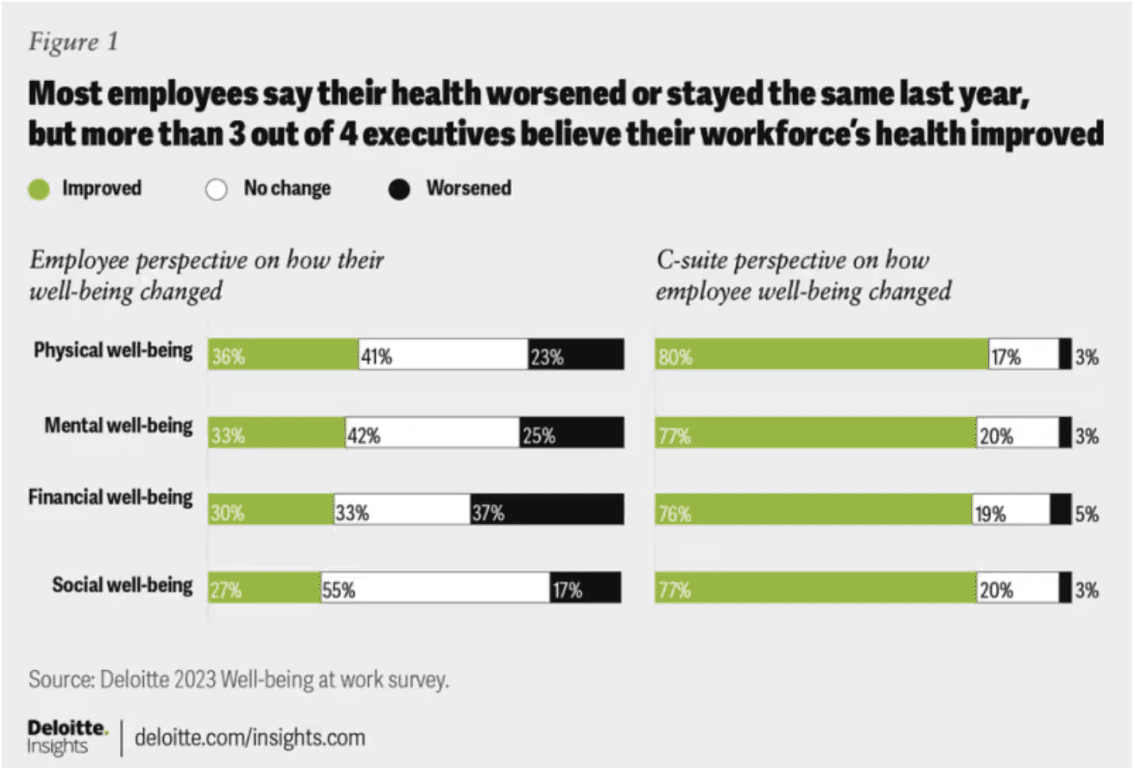Employers are asleep at the wellbeing wheel
According to Deloitte’s latest wellbeing study.
News in Brief
Deloitte finds that employee wellbeing is slipping, but executives can’t see it.
This wellbeing disconnect is pushing workers to quit their jobs.
Managers are the key to success, and HR needs to support them.
Half of employees always or often feel exhausted and stressed according to Deloitte’s 2023 wellbeing at work study.
The research, which surveyed more than 1,000 employees,1,000 managers, and 1,000 executives, found that less than half of respondents have the time to exercise each day and to get a good nights sleep.
These wellbeing challenges are directly linked to their jobs. Deloitte’s survey observed that 40% of workers see their jobs as having a negative effect on their mental state, and one in three report that their job is damaging to their physical health.
Although leaders know that they are responsible for employee wellbeing – 72% of the executives surveyed are in favor of their bonuses being tied to their organization’s wellbeing performance – they underestimate the extent to which employees are still struggling with their health and wellbeing.
While employees report a state of disarray, executives see improvement and progress.

Credit: Deloitte, 2023 Wellbeing at Work Survey
Clearly, organizations are asleep at the wellbeing wheel – as a result, they are risking high attrition rates.
Deloitte’s research found that 60% of employees, and three in four executives, are seriously considering quitting in search of a job with better wellbeing initiatives.
The data further suggests that workers value their wellbeing over their careers, as 84% report prioritizing their wellbeing and 74% put wellness ahead of career advancement.
Fixing the employee-employer wellbeing disconnect
Deloitte’s data shows that the disconnect between employees’ experience and employers’ attitudes towards wellbeing is not because of a lack of organizational effort or attention.
84% of the C-Suite told Deloitte that their organization has made a public commitment to office wellbeing. The issue is that just four in ten employees are aware of these commitments.
Another problem is that “many companies are failing to empower the people who are in a position to have a direct impact on workforce well-being: managers”, as stated by Deloitte’s report.
Although employees and managers agree that managers are at least partly responsible for employee wellbeing, just 54% of managers check in with employees on how they’re doing, and less than half ensure that employee workloads are reasonable (48%), make sure workers take breaks (47%), or encourage employee-use of companies’ wellbeing programs (38%).
Worst of all, just 26% of managers lead team wellbeing activities.
Nearly three quarters of managers believe they should be modeling wellness for their employees, but only 35% of workers say they have a clear picture of how their boss takes care of their own wellbeing.
The reason 32% of employee respondents feel their managers don’t care about their wellbeing is clear: managers are saying one thing and doing another.
HR, it’s time to hold managers accountable and make sure they have the tools needed to fulfill company commitments to wellbeing.
The Deloitte study concluded: “Work shouldn’t be the reason people feel exhausted, stressed, and isolated from friends and family.
“Employees should feel that they’re able to take time off and disconnect, and managers should feel capable of providing the support their team members need.
“Progress can happen, especially among organizations with leaders who are willing to take accountability for the health and wellbeing of their workforce.”
Sign up to the UNLEASH Newsletter
Get the Editor’s picks of the week delivered straight to your inbox!

Editorial Intern
Will is a Texas native studying Accounting and Journalism at SMU in Dallas.
